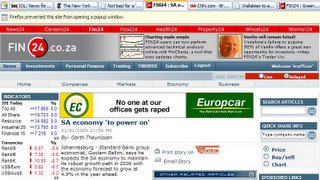Eskom vs the ANC
With one day of campaigning left, the ANC Western Cape branch's biggest opposition is Eskom, who -after promising uninterrupted supply yesterday- turned off power again today, sending Capetonians blood temperatures into orbit.
The trouble with parastatal entities like Eskom, is that the public largely perceives them as indistinct from government, and thus, from the ANC. Service delivery failures from Eskom are equated as service delivery errors from the ANC. However much the ANC tries to distance itself from this fact, the perception remains.
The fact that communication from Eskom has been so poor, and their plethora of promises consistently broken infers, rightly or wrongly, to the voting bloc that the local government places little emphasis on their constituents perceptions of it's efficiency. This only distances the seemingly arrogant and aloof local government from the voting public, which is never a good thing in the run-up to any election.
The Western Cape is undoubtedly going to run very, very close, and Eskom is currently adding to the opposition's case of service delivery, and detracting from the positive message broadcast out of the ANC ranks. Whether it will be enough to tip the scale's in the opposition's favour is yet to be seen, but it will surely be incredibly fresh in Capetonians' minds come tomorrow. A voting public casting their ballots in anger is the last thing a complacent incumbent needs.
One thing is for certain for me, I would dearly love to see the back of Cape Town Mayor Nomaindia Mfeketo, surely one of the most inept local government leaders yet seen in this country. Roll on the vote!







